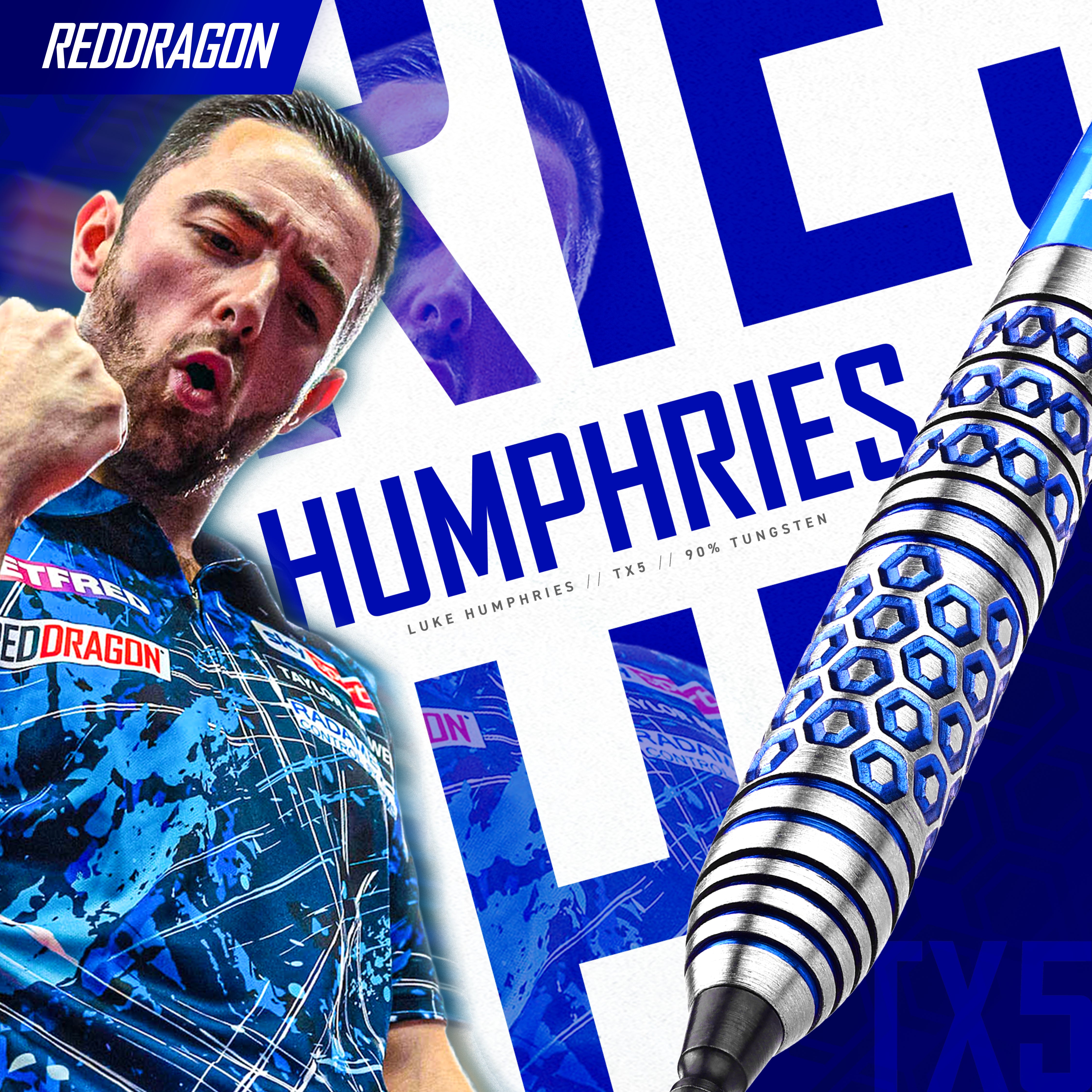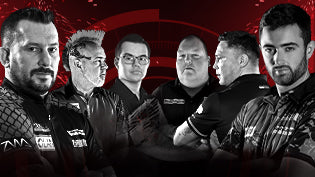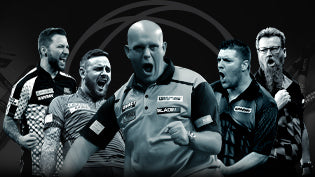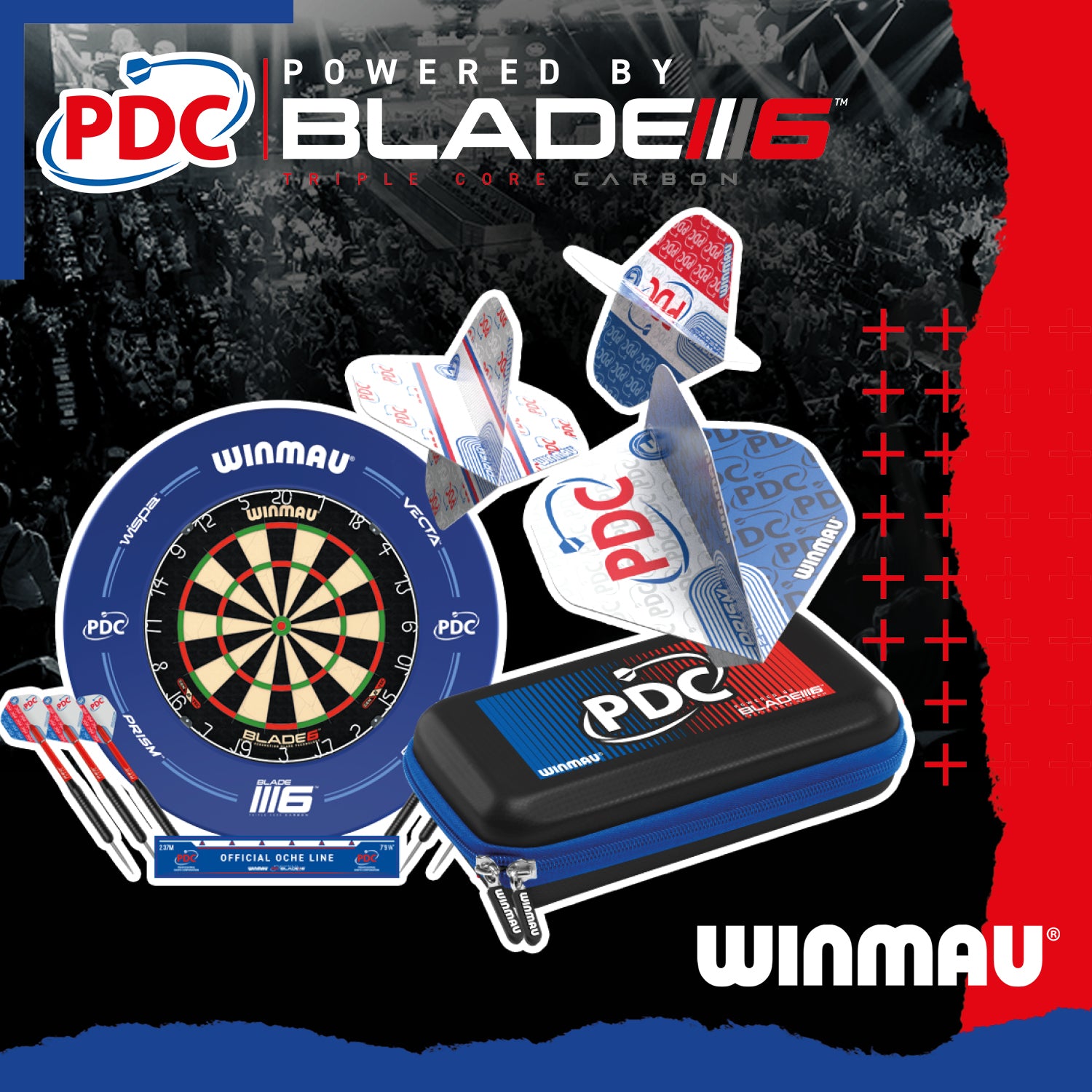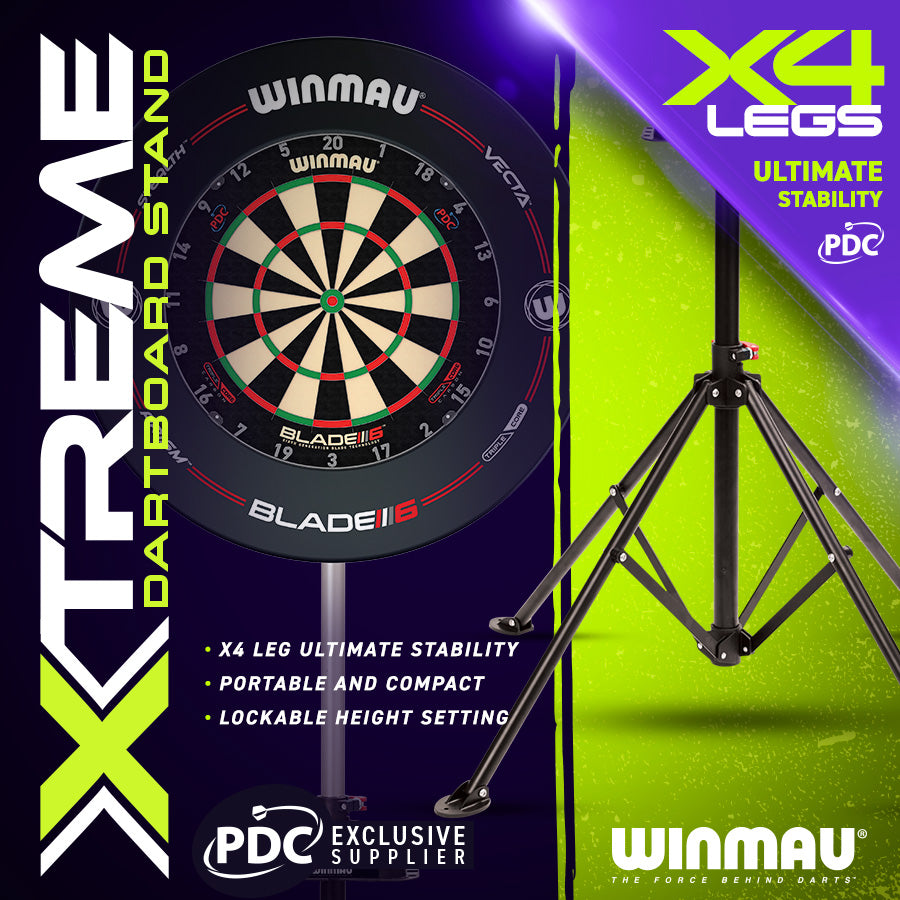DR DARTS NEWSLETTER - PATRICK CHAPLIN - JULY EDITION
WHERE INTERNATIONAL DARTS BEGAN
FIFTY YEARS AGO
THE FIRST DARTS HOME INTERNATIONAL -
1973
Can it really be this month fifty years since the first darts Home International took place?
But it’s true. In celebration of this event, I re-present to readers a revised article about the
historic first Home International that I prepared back in 2011, plus follow-up information
received from one of the men who was there.
In the early 1960s, darts businessman Eddie Norman had a dream.
Involved with darts from his earliest days Eddie returned to UK from abroad in 1962 and,
along with his brother Peter, founded The House of Darts International which was based in
Bristol.
At the same time Eddie founded the Bristol and District Darts League (BDDL) and in 1968
the Bristol Darts Organisation (“the original ‘BDO’”) later to be renamed the Bristol and
West of England
Darts Organisation and then later still the West of England Darts
Organisation.
The House of Darts International business grew and the company sponsored local leagues
and, in addition, during 1968, Eddie ran the local Super League and the Bristol Monday night
darts league.
Eddie told me
“At this time, the thoughts of the National Inter-City or National County Darts League
leading on to International Darts Championships between England, Wales, Scotland and
Ireland were always on my mind.”
Eddie gave himself ten years from 1963 to organise the First Home International Darts
Championship or die in the attempt.
In order to pursue his dream Eddie met with the only national darts association extant at that
time. He recalled,
“Throughout the 1960s I had numerous and very
long meetings with Johnny Ross of the National
Darts Association of Great Britain (NDAGB) to
discuss the possibility of organising a home
international through his Association. John was
as keen as mustard on the ideas I put to him but
it was always the same problem – Finance.”
(John Ross shown below, ‘at the mic’ – Image ©
PC Archive)
Money was the primary sticking point but the
idea – the dream – was never shelved and
Eddie’s resolve never faltered.
Then, as today, Eddie spoke on a voluntary basis at many small business meetings on
basically how a small business could succeed against their bigger company counterparts and
still be successful in exporting abroad. In mid-1971 at one of these business seminars,
something struck a chord as two leading firms who had been represented at this particular
meeting as they contacted him. One of these companies was Rothmans International (a
tobacco company), the other Berni Inns, a national company based in Bristol. (Much later,
Berni Inns were taken over by Watneys who themselves were eventually swallowed up by
Grand Metropolitan.)
Eddie recalled,
“I received a phone call from the marketing director of Berni Inns and the sales director
asking me to meet them. I had several meetings with them, and they told me that they were
impressed with my seminar speech and my ideas and would I like to work for the firm as the
manager of their PR department and overseas development section.”
Eddie gracefully declined the offer as his own business was growing apace and was
successful in its own right. However, ever the shrewd businessman Eddie turned the Berni
Inns offer to his own advantage. He said,
“I put a plan to Berni Inns. I told them that I would like to organise a Home International
Darts Championship in Bristol between England, Scotland, Ireland, and Wales and then
asked if they would sponsor the event. The international would be scheduled to coincide with
the celebration in 1973 of the 600th anniversary of Bristol’s County status (1373-1973), one
of a number of events planned for the overall celebration which was to be called ‘Bristol
600’.”
The two directors of Berni Inns listened intently to Eddie and asked him to put all his ideas in
writing which, of course, he was pleased to do. Part of Eddie’s plan was to ask Berni Inns to
agree a five-year sponsorship deal. This was the chance to turn his dream into a reality. Eddie
told me,
“A month later I was called to a board meeting of the Berni Inn directors. The result was that
they agreed my suggested five-year deal but with a firm proviso that I stayed in charge of the
organisation of the event for that term. They also agreed that the inaugural event would be
held in Bristol but that the second would be held in London at The Lyceum (which was owned
by the group).”
With his dream on the edge of fulfilment, Eddie started planning the first home international
in earnest in June/July 1972. The event would be in a giant circus-style marquee on Bristol
Durdham Downs and would include a revolving stage so that entertainment could be
provided between darts matches. Even back in 1973 the hire of the marquees ran into
thousands of pounds. Come the tournament, Berni Inns
accommodated all the teams in the Hawthorns Hotel
owned by the group. The company also paid for the
welcome dinner, programmes, and drinks for the teams.
They covered every aspect of sponsorship.
Eddie added
“Another part of the deal was that I had to find someone
of prominence to present the medals and trophy to the
winners.”
This was no problem for a man like Eddie. He told me,
“Twelve miles from Bristol is Badminton House, home
of the Badminton Horse Trials and country seat of the
Duke of Beaufort. Who better, I thought, than His
Grace the Duke of Beaufort, the Queen’s Uncle, to
present the prizes.”
People laughed at the idea and said that the Duke would never agree to it but Eddie took no
notice and wrote to the Duke. A week later at The House of Darts International Eddie had a
call from a butler at Badminton House. Eddie said
“The butler said that the Duke would like me to call for drinks to discuss my letter and what I
wanted him to do. He was very interested in attending the event.”
The next week Eddie had lunch with the Duke at Badminton House, a three-hour meeting,
followed by a private tour of the house. The Duke agreed to come and present the prizes, and
meet the teams. (“Oh, ye of little faith!”)
Eddie told me
“The next step was to sort out the teams. I first contacted Ossie Turner, Secretary of the
Welsh NDAGB. He jumped at the idea of forming a Welsh International team. I then flew into
Dublin to the Kings Inn Bar and its host the great and only Louis Donohue who ran darts
throughout the whole of Ireland. He promised to put an Ireland team together. On to
Scotland and the wonderful Frank Quinn, President of the Scottish Darts Association (SDA).
He promised to have a Scottish team there. Finally, I asked Olly Croft if he would be
manager of England and select an England team for the first ever Home International Darts
Championship. Olly promised that he would and so the quartet was formed.”
All Eddie had to do then was to organise the event, to get the show on the road, hoping all the
time that things would work out as he had planned. Eddie said:
“My brother Peter [pictured, above] agreed to work the
electric scoreboard - There was no one better than
Peter on the scoreboard - and my great friend Jack
Price [pictured below] would compere the whole
event.”
Soon, everything was in
place for the great day –
Sunday 29th July 1973. The
teams and managers all
arrived at the hotel for the pre-match dinner and thankfully the
programmes arrived on time. Eddie recalls
“It was a glorious day. The Duke of Beaufort and the Lord
Mayor of Bristol arrived in separate Rolls Royces. Berni Inns
sent along their three main directors and another special guest
was Herta Grisley of NODOR whose company sponsored both
the Irish and Welsh team by the provision of team shirts and
paying the cost of transport. The 1,000 tickets allocated for the event were completely sold
out and organisers had to turn people away on the day.
On the day, all was going well but then...
Eddie told me
“We had a revolving stage at the event and the England team was introduced and the
national anthem was played. That was fine but then the Scottish team came round on the next
turn of the stage, Bill Sheppard (Chairman of The West of England Darts Organisation) was
putting the records on and I had the record marked ‘Scotland the Brave’ but I think it was
Tommy O’Regan and Alan Cooper from the England team who switched the records and put
in the packet ‘By a Babbling Brook’ by singer Donald Peers!
Bill, who had had a few drinks to steady his nerves, never looked at the label and so the poor
old Scottish lads stood bewildered as the record was played as they arrived front of stage.
The same England guys had also switched the Ireland record and again Bill played the one
that had been switched and I think it was the Sinn Fein anthem that was played. The poor old
Irish team nearly passed out!”
There were problems with the national flags too. Eddie said
“The Welsh flag was smaller than the rest. I had purchased the England, Scottish, Welsh, and
Irish flags but then the Welsh one went missing the day before the tournament. I rang Ossie
Turner to ask him if he could get a large Welsh flag and bring it over. “No problem, Boyo”,
he said but when he came over, he presented me with the smallest flag I had ever seen. By
way of explanation, he told me that the Welsh Boys did not want to look too big-headed and
he thought the one he had brought over was what the other flags would be like.”
Each country’s team consisted of seven players and each player played one game of 801
against an opponent from another country, drawn out of the hat beforehand. All games were
played from a 7’ 6” throw line.
The first winners of the inaugural Home International were England (sponsored by Trulon (a
darts company)) and team captain Tommy O’Regan gratefully accepted the trophy from the
Duke of Beaufort. Manof-the-match was
England’s Cliff Inglis,
receiving a special prize
for being the most
consistent player. Out
of a possible total of 21
points England scored
17, one point for each
of the seventeen
individual games won.
Wales came second
with 11 points, Scotland
third with eight points
and Ireland in fourth
and final place with six
points.
England played strongly throughout and deserved their victory. England’s manager Olly
Croft said afterwards
“Today will be the most memorable occasion for the England team and myself on winning
the first-ever home international” adding “For me the greatest thing is at last knowing that I
made the right choice in picking the best team and the best captain, Tommy O’Regan.”
Eddie added, “Tommy must have been the only Irishman ever to play for England.”
(Image, above, shows
Tommy O’Regan being
presented with the trophy
by the Duke of Beaufort)
Scotland’s Bob McCord
told Darts World
“The trouble was that
[we] all suffered a bit
from nerves and the
English and Welsh have
been through all this sort
of thing before. None of
them batted an eyelid.”
Welsh team captain, Leighton Rees, said,
“The best team won. It was a close thing and all the lads played well…there was so little in
it…next year it could be anybody’s day.”
Even though Ireland came last Joe Regan, a member of the Irish team, said
“I was going to retire this year, but after this I’ve decided not to. It’s brought my interest
back.”
After the event Eddie received more than one hundred letters thanking him for a great day,
including ones from the Lord Mayor of Bristol and the Duke of Beaufort. Eddie told reporters
that Berni Inns were ‘over the moon’ with the event and promised bigger and better things at
the 1974 event in London. Darts World pronounced the tournament as ‘an outstanding
success’ and confidently predicted that the Home Internationals would become ‘a major event
on the darts calendar.’ A spokesman for Berni Inns enthused. “There is no reason why the
British Home International Darts Championship should not become a permanent fixture.”
But then, a little later, came a hammer-blow for Eddie…
Eddie told me
“But then I was informed by the newly-formed British Darts Organisation (BDO) that the
event was now too big and too important for an individual like me to run and that it should be
taken over by them.”
And there was more. Eddie added
“Worse still, Ossie Turner was not asked to select the Welsh team for the 1974 event as there
was now a Welsh Darts Organisation who were affiliated to the BDO and they were asked to
select a team. Ossie Turner was very upset and rightly so. He had helped me from the
beginning of my dream and was now on the outside looking in.”
However, the second Home International held in 1974 at
The Lyceum was organised by Eddie and his team and
was also a success. £5,000 was given to Children’s
Charities by Berni Inns for the excellent work and
publicity they had received from Eddie’s work at the
inaugural event the previous year. TV personality
Michael Parkinson accepted the cheque on stage on
behalf of the charity.
However, two weeks after the event, Eddie received a
call from Berni Inns directors asking him to meet them
for lunch. Eddie told me
“They reminded me that the company had agreed that
they would only sponsor the event for five years if I was
running and organising the event. As I was now on the
outside and the event was being organised by the BDO
in London and not by me in Bristol, they said they were unhappy to work with anyone else
and were left with no other choice but to withdraw their future sponsorship and involvement
in the event. This they did and dropped their sponsorship, although they continued to
sponsor darts in Bristol at a local level.”
Thus, Eddie’s dream from the early 1960s of organising the first-ever full home international
had been realised in 1973. However, fate (or rather the BDO) had decreed that thereafter it
was out of his hands. Eddie accepted the position and moved on.
In January 2011 I asked Eddie to encapsulate his feelings about a now famous tournament
that began with his dream - his vision – that still runs to this day. He told me
“Looking back in 2011 on that great day in July 1973 when the very first Home
Internationals were played in a circus marquee in blistering heat on Durdham Down in
Bristol, it makes me smile thirty-eight years later when I see how proud players are to wear
their national team shirt as they represent their countries.
Many probably do not have an inkling as they put on their international shirts today of how
great it was all those years ago to see the greatest players ever like Tommy O’Regan, Willie
Etherington, Roger Smith, Alan Cooper and all the rest of those immortal players smile and
stand proudly as they represented their countries in the first-ever Home International Darts
Championship.
They do say the first is always the best and so I believe it was as those great players of the
1970s played in that very first home international and for the team managers, all the hardworking officials and sponsors and His Grace, the Duke of Beaufort who all made it a day to
remember; a day that has gone down in darts history. And remember this was before the days
of the British Darts Organisation
Today, as I reflect on that great event, I think the international players of today, men and
women, have a great deal to thank everyone of those who took part in July 1973 for what they
are taking part in today as they
represent their nations of England,
Wales, Ireland and Scotland.”
The Home International continued to
be held by the BDO but after that
organisation collapsed, it was
subsequently taken over by the TriNations Darts Association and was, at
this time, last held in June 2022.
AFTERWORD: A couple of months
ago, Eddie e-mailed to tell me
‘I met up, with a few veteran darts
friends last night (12th June) and, as
usual, the talk got around to darts of
yesterday. The year we were talking about was 1973, 50 years ago, and next month, it will be
50 years since I organised the First Home International Darts Championship, here in Bristol.
That is unbelievable.
I remember it like yesterday, a very hot July day with players and supporters from across the
United Kingdom all packed into a giant marquee like sardines on Bristol Downs now less
than 400 yards from where I live today.
The same year I chartered a 146-seater plane to fly from Bristol to Ludvika in Sweden for the
Sweden Open which Kim Brown won that year. To make the trip economical, I had to sell the
flights to Swedish football supporters to fly to London for the weekend. So, the plane took off
from Bristol, flew to Sweden then to London, back to Sweden, then back to Bristol,
Yes. 1973 was a good year for darts. Look what it led to today!
Finally, Eddie told me
‘My daughter Leigh was 9 years old when the tournament was
on and always felt she should have had a mention as she was
the ‘flower girl’ and a very pretty one on the day, walking
around with a beautiful basket, containing bouquets of flowers
that she presented to the Lady Mayoress of Bristol, the
Duchess of Beaufort and the Berni Inns directors’ wives.
She might be joking but always tells people how she was the
‘flower girl’ at a darts event in a big marquee on the Bristol
Downs dressed as a little Welsh girl with a basket of flowers. ’
Sadly, despite searching through my archive, I was unable to find a photograph of Leigh
dressed as a Welsh girl at the event back in 1973 BUT her dad has provided me with an
image of her, a little older, (see above, right) attending Buckingham Palace in 1989 when her
father, Eddie, collected his MBE from the Queen.
© 2011-2023 Patrick Chaplin
With special thanks to Dr. Eddie Norman
-----------
FALLON SHERROCK AWARDED MBE IN KING’S BIRTHDAY HONOURS
Fallon Sherrock has been awarded
an MBE in the 2023 King's
Birthday Honours list to recognise
her services to the sport of darts.
Sherrock has made a huge global
impact for women's darts in recent
years, starting with her historymaking wins over Ted Evetts and
Mensur Suljovic as she became the
first female winner at the PDC
World Darts Championship in
December 2019.
She later reached the final of the 2021 Nordic Darts Masters event, losing to Michael van
Gerwen, and also reached the Grand Slam of Darts quarter-finals that year.
Sherrock then won the inaugural Betfred Women's World Matchplay in July 2022, while she
has also won ten PDC Women's Series titles since the tour was introduced in 2020 and
became the first woman to hit a nine-dart finish in a PDC event on the Winmau Challenge
Tour earlier this year.
"I am honoured and overwhelmed to have been awarded an MBE in the King's Birthday
Honours for services to darts," said Fallon Sherrock.
"To have received this level of recognition for my contribution to the game I love is beyond
my wildest dreams.
"I never considered that I would ever receive such an esteemed honour and I am beyond
grateful.
"I have been fortunate to hear of the widespread impact that my success has had in getting
more people watching and playing darts, and particularly in inspiring girls and young women
to take up darts and other sports. That makes me incredibly proud and excited.
"That is a worthwhile legacy, all stemming from one landmark moment at Alexandra Palace
followed by other successes, and is something that I want to continue to promote.
"I am looking forward to visiting Buckingham Palace to receive this honour, which I regard
as a reflection of the enormous popularity of darts and as a symbol hope and possibility for
aspiring darts players and sportswomen across the country."
Sherrock, who is in line to defend her Women's World Matchplay title next month in
Blackpool, joins illustrious company in former World Champions Eric Bristow and John
Lowe and fellow female star Trina Gulliver as darts stars to be awarded the MBE.
"We congratulate Fallon on being awarded the MBE and this is a great recognition for the
impact she has made in the sport in recent years," said PDC Chief Executive Matt Porter.
"She has been a global trailblazer for women's darts and has helped to raise standards in
women's darts to a new level.
"This will be another boost for women's darts and we also hope that this can spur on Fallon to
further success."
Alongside the introduction of the Women's World Matchplay in 2022, which is broadcast
globally and played at the Winter Gardens in Blackpool during the Betfred World Matchplay,
the PDC Women's Series has expanded this year to 24 events and saw prize money doubled
to £10,000 per tournament.
The PDC's commitment to women's darts also includes places in the World Darts
Championship and Grand Slam of Darts, giving players the chance to test themselves
alongside the biggest names in the sport.
Lisa Ashton held a PDC Tour Card in 2020/2021, while Beau Greaves won an incredible ten
events in a row and has claimed 12 titles in under a year on the PDC Women's Series circuit.
Text © PDC 2023. Image © PDC/Lawrence Lustig
Note: Due to the publication of the Home International celebration article, a number of
items have been held back until the August issue.
MY RESEARCH IS SPONSORED BY WINMAU.
NOTE: Text © 2023 Patrick Chaplin or as shown. Images © Patrick Chaplin or as stated or
sourced. Neither text nor images can be reproduced without prior permission of the
copyright holder(s).




